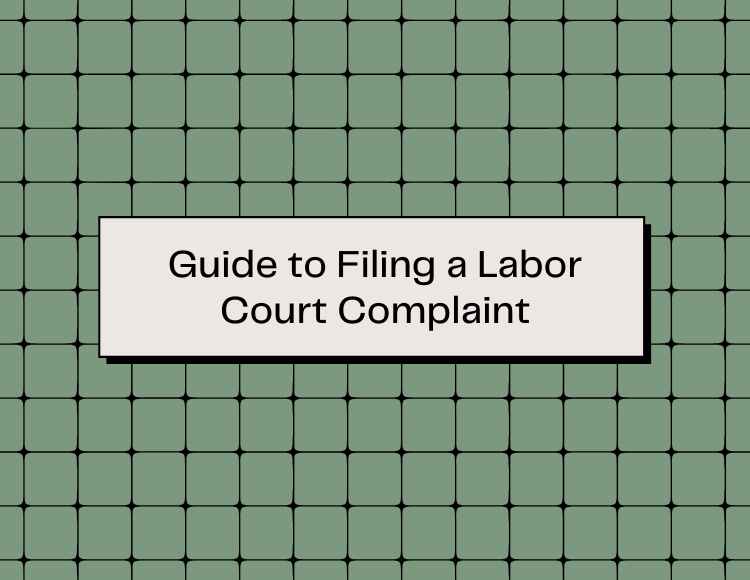Leaving a job in Saudi Arabia comes with the expectation of receiving your End-of-Service Benefit (EOSB), commonly called gratuity. It’s not a favor—it’s your legal right under Saudi Labor Law. But what if your employer refuses to pay? It can be frustrating, stressful, and financially challenging.
Saudi Gratuity After 10 Years of Service: What to Expect
The good news? You have legal options! Saudi Arabia has a clear process for handling labor disputes, including unpaid gratuity claims. This guide will walk you through every step, from understanding your rights to filing a complaint with the Ministry of Human Resources and Social Development (MHRSD) and, if needed, taking your case to the Saudi Labor Court.
What Is End-of-Service Gratuity (EOSB), and Why Do Disputes Happen?
End-of-Service Gratuity (EOSB) is a financial compensation employers must provide to employees when their job ends. The amount depends on how long you worked and your final salary. Saudi Labor Law (Articles 84 & 85) outlines the calculations for employees who resign versus those terminated by their employer.
Why might an employer refuse to pay?
- Miscalculations – Employers may miscalculate the amount due.
- Financial struggles – The company may be unable to pay.
- Unfair claims – Some employers wrongly claim termination was “for cause” under Article 80 to avoid paying gratuity.
- Deliberate refusal – Some employers simply refuse to pay, hoping employees won’t take action.
If you’re owed gratuity and haven’t received it, you must act.
Expat Gratuity Rights in Saudi Arabia: Resignation vs. Termination
Step 1: Prepare Before Filing a Complaint
Taking the right steps before filing can strengthen your case.
1. Calculate Your Gratuity
Know the exact amount you’re owed based on:
- Your contract terms
- Last salary (basic pay + allowances like housing and transport)
- Length of service
Note: If you resign after 10+ years or under specific conditions (Article 81), you may still qualify for full gratuity.
2. Gather Key Documents
Having the right paperwork is crucial. Make copies of:
- Employment contract (signed copy)
- Iqama (residence permit)
- Salary proof (payslips or bank statements)
- Termination/resignation letter
- Final exit visa (if applicable)
3. Contact Your Employer First
Before filing a complaint, try to resolve the issue directly:
- Send a formal email or letter to HR.
- Clearly state the amount you are owed.
- Refer to your contract and service duration.
- Request payment within a set deadline (e.g., 7–14 days).
- Keep copies of all communications as evidence.
If your employer ignores you or refuses, move to the next step.
Step 2: File a Complaint on the MHRSD ‘Widdi’ Platform
If direct communication fails, you must file a complaint with the Ministry of Human Resources and Social Development (MHRSD). This is done through the Widdi platform, designed for resolving labor disputes through mediation.
How to File a Complaint on Widdi
- Log in to the MHRSD website using your Absher account.
- Navigate to the Labor Dispute Section.
- Fill out the complaint form with:
- Your Iqama number and contact details
- Your employer’s company name (establishment number if available)
- Your employment details (job title, start and end dates, salary)
- A clear statement of your unpaid gratuity claim
- Upload supporting documents (contract, salary proof, letters, communication records).
What Happens Next?
- MHRSD assigns a specialist to mediate between you and your employer.
- A mediation session is scheduled (often online).
- Resolution should happen within 21 working days.
Possible Outcomes
✔ Successful Settlement – If you and your employer reach an agreement, the amount is documented, and the employer must pay.
❌ No Settlement – If no agreement is reached, the case moves to the Labor Court.
Step 3: Taking the Case to the Saudi Labor Court
If Widdi mediation fails, the next step is filing a formal case with the Saudi Labor Court.
How to File a Case
- Your case moves from MHRSD to the Labor Court.
- You may need to submit a Statement of Claim through the Najiz portal, referencing your Widdi case number.
- The court reviews your documents, listens to both sides, and issues a verdict.
Step 4: Preparing for Court
At this stage, solid preparation is key.
What You’ll Need:
✔ Statement of Claim – A legal document explaining your claim, citing relevant laws.
✔ All Evidence – Employment contract, payslips, termination/resignation letters, communication with the employer, and Widdi outcome report.
✔ Translations (if needed) – Court proceedings are in Arabic, so all documents should be translated.
✔ Legal Representation – While not mandatory, hiring a labor lawyer improves your chances of success.
Essential Documents Checklist
Make copies and keep originals safe:
✔ Valid Iqama and Passport
✔ Employment Contract (original Arabic version if possible)
✔ Salary Proof (bank statements, payslips)
✔ Termination/Resignation Letter
✔ MHRSD Widdi Case Report
✔ Final Exit Visa (if applicable)
✔ All communication with the employer
✔ Gratuity calculation sheet
Step 5: Court Decision & Enforcement
What Happens After the Verdict?
- If the judge rules in your favor, the employer is legally required to pay the amount owed.
- If the employer still refuses to pay, the judgment can be enforced through the Enforcement Court (Tanfeeth), which can:
- Freeze company assets or bank accounts
- Impose penalties on the employer
Key Considerations
1. Act Quickly!
You have 12 months from your last working day to file a gratuity claim. Delaying could result in losing your right to claim.
2. Expect Court Hearings
The employer can defend their case, so multiple sessions may be needed before a final decision is made.
3. Legal Fees & Costs
Filing through MHRSD is usually free, but hiring a lawyer and translating documents may have costs.
Frequently Asked Questions (FAQs)
Q1: How long does the process take?
- Widdi mediation: 21 working days.
- Labor Court: Several months, depending on complexity.
Q2: Do I need a lawyer?
- Not for Widdi mediation, but strongly recommended for the Labor Court.
Q3: What if my employer closed the company or left Saudi Arabia?
- You may still claim against company assets or the employer personally, but legal guidance is essential.
Q4: Can I file a complaint after leaving Saudi Arabia?
- Yes, but you may need to appoint a lawyer in Saudi Arabia through a power of attorney (Wakala).
Q5: What if I don’t have a written contract?
- Other proof, such as bank statements, payslips, and witness testimony, can support your case.
Conclusion: Know Your Rights & Take Action
Your End-of-Service Gratuity is a legal right. By following the MHRSD Widdi process and, if necessary, taking your case to Labor Court, you can recover what you are owed. Act fast, prepare well, and seek legal advice if needed.
If you’re facing unpaid gratuity issues, don’t stay silent—file your claim today!

